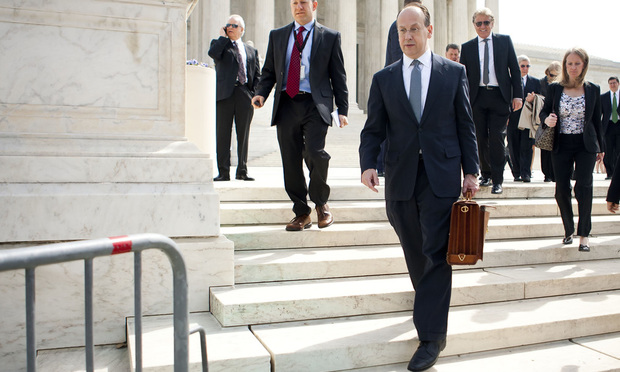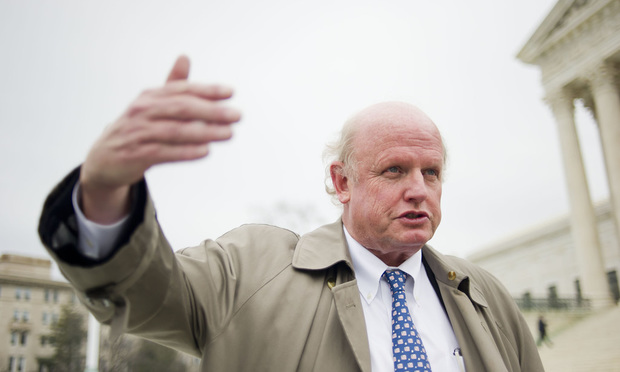How Paul Clement Is Defending Obama's Consumer Protection Bureau
"This case presents a remarkably weak case for invalidating an Act of Congress. There is no actual contested removal, and the current director views herself as serving at the pleasure of the president," the Kirkland & Ellis partner told the Supreme Court on Wednesday.
January 15, 2020 at 02:29 PM
6 minute read
 Paul Clement of Kirkland & Ellis. Photo: Diego M. Radzinschi/NLJ
Paul Clement of Kirkland & Ellis. Photo: Diego M. Radzinschi/NLJ
A leading conservative U.S. Supreme Court advocate on Wednesday urged the justices to uphold the single-director independent design of the Consumer Financial Protection Bureau, arguing that Congress had authority to limit the power of the president to fire the agency's leader.
The justices are set to hear arguments in the case Seila Law v. Consumer Financial Protection Bureau in March, and the dispute is widely viewed as a potential blockbuster in the constitutional law arena. The case is focused on a consumer regulatory agency long demonized by Republicans on Capitol Hill. The Supreme Court's newest member, Justice Brett Kavanaugh, has assailed what he called the consumer bureau's "massive, unchecked power."
The Supreme Court selected Paul Clement of Kirkland & Ellis to defend the consumer bureau, after the agency itself and Trump's Justice Department aligned with financial services companies and business advocates to back their arguments against the regulator. The Obama-era Justice Department had defended the agency, whose legacy stems from the Dodd-Frank financial industry reforms of 2010.
"First, and most obviously, there is no 'removal clause' in the Constitution," Clement wrote in Wednesday's Supreme Court filing. "Beyond the provisions for impeachment, the constitutional text is simply silent on the removal of executive officers, which is hardly a promising basis for invalidating an act of Congress."
Federal law only allows the president to remove the bureau's director for cause, not at will. The bureau's director, who is now Kathy Kraninger, serves a five-year term. Critics of the agency have long argued the bureau's director is too insulated from accountability. The agency is not set up like multimember federal shops—including the Federal Trade Commission and the U.S. Securities and Exchange Commission—with bipartisan leaders.
The appointment of Clement, who clerked for the late Justice Antonin Scalia, caught some legal observers by surprise. The veteran Supreme Court advocate and former U.S. solicitor general in the George W. Bush administration has widely championed business interests and conservative ideals in major cases in courts across the country. The Kirkland team working with Clement includes partners Erin Murphy and Matthew Rowen, and associate Andrew Lawrence.
The case involves the California-based debt collection firm Seila Law, which is represented at the Supreme Court by Kannon Shanmugam of Paul, Weiss, Rifkind, Wharton & Garrison. Seila Law is resisting a bureau investigation looking at whether the firm engaged in any anti-consumer practices involving the marketing, advertising and sale of debt-relief services.
The U.S. Court of Appeals for the Ninth Circuit ruled in May against Seila's constitutional arguments and upheld the single-director scheme and removal provision as lawful. Financial regulators such as the CFPB have long been accorded "a measure of independence," the appeals court said.
Clement noted that Kraninger, the CFPB director, has the power to drop the investigation of Seila Law, which was initiated under the bureau's first leader, Richard Cordray, who resigned in November 2017.
 CFPB Director Kathy Kraninger testifies at House Financial Services Committee. Photo: Diego M. Radzinschi /ALM
CFPB Director Kathy Kraninger testifies at House Financial Services Committee. Photo: Diego M. Radzinschi /ALM"That she has not done so despite her view that she serves at the pleasure of the president makes crystal clear that the enforcement action that forms the basis of petitioner's injury has nothing to do with the constitutional issue it asks this court to decide," Clement wrote in his new filing.
Clement also argued: "The theory of the unitary executive appears alive and well in the director's office. The dispute here is not just unripe, but entirely theoretical. This case simply does not present a proper occasion for this court to resolve the undoubtedly important question petitioner asks it to decide." He described Seila Law's challenge as "remarkably weak."
Congress, according to Clement, "broke no new ground in so structuring the bureau." He said the agency's scheme mirrors that of the Office of Special Counsel, Comptroller of the Currency and the Social Security Administration.
Seila Law's Supreme Court case has attracted more than 20 friend-of-the-court briefs representing a range of interests, including regulated parties, elected officials and legal scholars. Twenty-seven members of the U.S. House, represented by Jones Day's Michael Carvin, filed a brief in support of Seila Law.
 Michael Carvin after arguing for the plaintiffs in King v. Burwell. March 4, 2015. Photo: Diego M. Radzinschi / NLJ
Michael Carvin after arguing for the plaintiffs in King v. Burwell. March 4, 2015. Photo: Diego M. Radzinschi / NLJ"The Consumer Financial Protection Bureau is an unprecedented threat to the separation of powers and to the democratic legitimacy of the federal government. By design, it is one of the nation's most powerful executive agencies," Carvin wrote. "It has vast power to regulate the national economy by setting consumer protection policy and enforcing federal law. Under the Constitution, this agency cannot be allowed to operate as a Platonic guardian without any popular control."
The Supreme Court, in addition to weighing the constitutional issues, is expected to grapple with a remedy—and many of the briefs look at that part of the case. The Credit Union National Association, represented by Julian Ellis Jr. of Brownstein Hyatt Farber Schreck, asked the justices to "shift the responsibility for fixing the bureau's structure to the political branches."
Read more:
Justices Pick Paul Clement to Defend Consumer Bureau's Independence
SCOTUS Will Hear Major Challenge to Independence of Consumer Bureau
Paul Weiss Pokes Gibson Dunn in New SCOTUS Brief in Consumer Bureau Case
CFPB, Changing Stance, Backs Law Firm Fighting Agency's Independent Design
'Race to the Bottom': Paul Clement Questions DOJ's Anti-Obamacare Stance
D.C. Circuit's Brett Kavanaugh Doubles Down on Criticism of CFPB
This content has been archived. It is available through our partners, LexisNexis® and Bloomberg Law.
To view this content, please continue to their sites.
Not a Lexis Subscriber?
Subscribe Now
Not a Bloomberg Law Subscriber?
Subscribe Now
NOT FOR REPRINT
© 2025 ALM Global, LLC, All Rights Reserved. Request academic re-use from www.copyright.com. All other uses, submit a request to [email protected]. For more information visit Asset & Logo Licensing.
You Might Like
View All
Trump Administration Faces Legal Challenge Over EO Impacting Federal Workers
3 minute read
US Judge Cannon Blocks DOJ From Releasing Final Report in Trump Documents Probe
3 minute read
Private Equity Giant KKR Refiles SDNY Countersuit in DOJ Premerger Filing Row
3 minute readLaw Firms Mentioned
Trending Stories
- 15th Circuit Considers Challenge to Louisiana's Ten Commandments Law
- 2Crocs Accused of Padding Revenue With Channel-Stuffing HEYDUDE Shoes
- 3E-discovery Practitioners Are Racing to Adapt to Social Media’s Evolving Landscape
- 4The Law Firm Disrupted: For Office Policies, Big Law Has Its Ear to the Market, Not to Trump
- 5FTC Finalizes Child Online Privacy Rule Updates, But Ferguson Eyes Further Changes
Who Got The Work
J. Brugh Lower of Gibbons has entered an appearance for industrial equipment supplier Devco Corporation in a pending trademark infringement lawsuit. The suit, accusing the defendant of selling knock-off Graco products, was filed Dec. 18 in New Jersey District Court by Rivkin Radler on behalf of Graco Inc. and Graco Minnesota. The case, assigned to U.S. District Judge Zahid N. Quraishi, is 3:24-cv-11294, Graco Inc. et al v. Devco Corporation.
Who Got The Work
Rebecca Maller-Stein and Kent A. Yalowitz of Arnold & Porter Kaye Scholer have entered their appearances for Hanaco Venture Capital and its executives, Lior Prosor and David Frankel, in a pending securities lawsuit. The action, filed on Dec. 24 in New York Southern District Court by Zell, Aron & Co. on behalf of Goldeneye Advisors, accuses the defendants of negligently and fraudulently managing the plaintiff's $1 million investment. The case, assigned to U.S. District Judge Vernon S. Broderick, is 1:24-cv-09918, Goldeneye Advisors, LLC v. Hanaco Venture Capital, Ltd. et al.
Who Got The Work
Attorneys from A&O Shearman has stepped in as defense counsel for Toronto-Dominion Bank and other defendants in a pending securities class action. The suit, filed Dec. 11 in New York Southern District Court by Bleichmar Fonti & Auld, accuses the defendants of concealing the bank's 'pervasive' deficiencies in regards to its compliance with the Bank Secrecy Act and the quality of its anti-money laundering controls. The case, assigned to U.S. District Judge Arun Subramanian, is 1:24-cv-09445, Gonzalez v. The Toronto-Dominion Bank et al.
Who Got The Work
Crown Castle International, a Pennsylvania company providing shared communications infrastructure, has turned to Luke D. Wolf of Gordon Rees Scully Mansukhani to fend off a pending breach-of-contract lawsuit. The court action, filed Nov. 25 in Michigan Eastern District Court by Hooper Hathaway PC on behalf of The Town Residences LLC, accuses Crown Castle of failing to transfer approximately $30,000 in utility payments from T-Mobile in breach of a roof-top lease and assignment agreement. The case, assigned to U.S. District Judge Susan K. Declercq, is 2:24-cv-13131, The Town Residences LLC v. T-Mobile US, Inc. et al.
Who Got The Work
Wilfred P. Coronato and Daniel M. Schwartz of McCarter & English have stepped in as defense counsel to Electrolux Home Products Inc. in a pending product liability lawsuit. The court action, filed Nov. 26 in New York Eastern District Court by Poulos Lopiccolo PC and Nagel Rice LLP on behalf of David Stern, alleges that the defendant's refrigerators’ drawers and shelving repeatedly break and fall apart within months after purchase. The case, assigned to U.S. District Judge Joan M. Azrack, is 2:24-cv-08204, Stern v. Electrolux Home Products, Inc.
Featured Firms
Law Offices of Gary Martin Hays & Associates, P.C.
(470) 294-1674
Law Offices of Mark E. Salomone
(857) 444-6468
Smith & Hassler
(713) 739-1250











